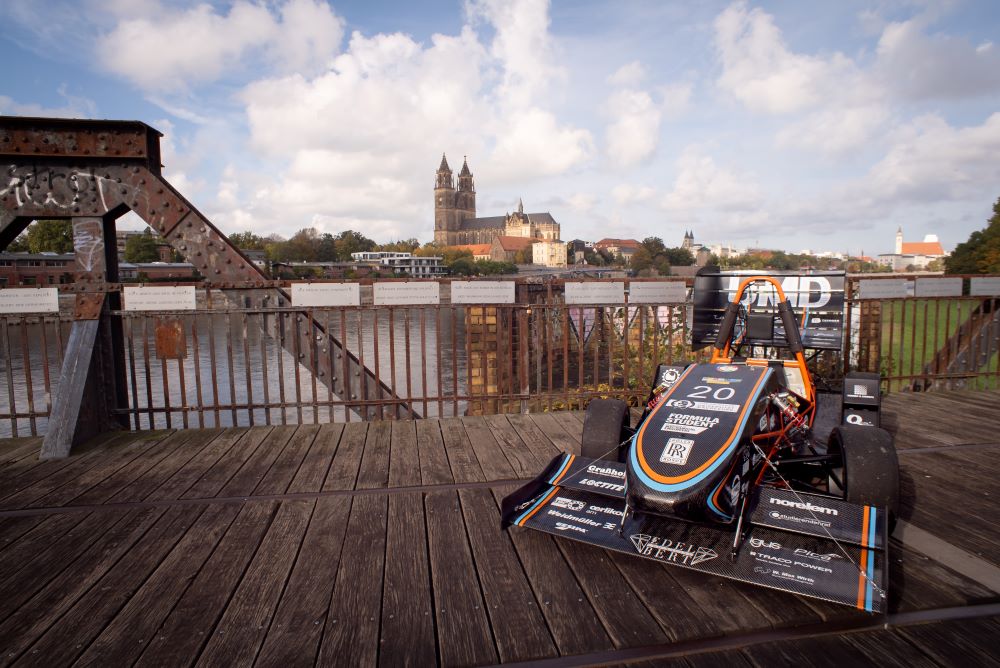Collaborazione UMD Racing - VA Imaging
UMD Racing, un'organizzazione gestita da studenti dedicata allo sviluppo di auto da corsa elettriche, partecipa attivamente alle competizioni Formula Student.

UMD Racing, un’organizzazione gestita da studenti dedicata allo sviluppo di auto da corsa elettriche, partecipa attivamente alle competizioni Formula Student. Durante i numerosi eventi annuali, il team punta a progettare e produrre un’auto ad alte prestazioni per competere contro altri team di studenti. La visione del team di competere nella categoria driverless li ha spinti a rivolgersi a VA Imaging per l’hardware Telecamera. La loro attenzione all’innovazione e alle prestazioni li ha portati a scegliere la Telecamera MER2-041-528U3C, dotata del sensore SONY IMX287.
Sponsorizzazione
La decisione di collaborare con VA Imaging è stata influenzata dalla chiarezza e trasparenza del sito web e dai prezzi competitivi. Inoltre, gli studenti di UMD Racing cercavano requisiti specifici, come un elevato frame rate. Una delle Telecamere machine vision ad alta velocità di VA Imaging con 528fps soddisfaceva questi requisiti. Questo ha avuto un ruolo cruciale nella loro decisione di contattare il team VA Imaging per le esigenze del loro sistema di visione.
Competizione di corsa
Lo scorso anno, UMD Racing ha partecipato sia alla Formula Student Germany che alla Formula Student UK con la propria auto elettrica. Durante la competizione, l’auto viene valutata su diversi criteri come aspetti tecnici, efficienza e prestazioni complessive. Lo sviluppo interno li distingue dagli altri team. Mentre altri scelgono componenti standard, il team UMD Racing sviluppa autonomamente unità di calcolo come i PCB. Le loro prestazioni eccezionali hanno permesso loro di vincere il premio per l’auto più efficiente nella competizione nel Regno Unito.
L’auto
Il team di studenti mira a competere nella categoria driverless con un’auto completamente autonoma. Rispetto alla costruzione dell’auto elettrica generale, la parte autonoma presenta alcune sfide aggiuntive. Una di queste sfide è abbinare i calcoli teorici con il frame rate effettivo. Tuttavia, le conoscenze del team e gli strumenti a disposizione consentono a UMD Racing di lavorare sul perfezionamento e il miglioramento del programma per allineare entrambi. Nel frattempo, una parte del team lavora sull’auto elettrica generale per il 2024 mentre il resto del team continua lo sviluppo per l’auto driverless. I primi test sul campo sono previsti per la fine del 2024.
Per realizzare questa ambizione, verrà utilizzata una Telecamera industriale come sensore di velocità al suolo e molto probabilmente due Telecamere accanto al sedile del conducente. Queste due Telecamere supportano l’auto nel posizionamento rilevando oggetti come i coni sulla strada.
L'hardware di visione
I seguenti componenti di machine vision vengono utilizzati nel sistema di visione dell'auto come sensore di velocità al suolo:

- MER2-041-528U3C: Questa è una Telecamera USB3 da 0,41MP con C-mount, in grado di acquisire 528 fotogrammi al secondo alla massima risoluzione.
- VA-LCM-5MP-04MM-F2.0-015: Questo è un obiettivo C-mount da 4MM per acquisire immagini con un tasso di distorsione inferiore allo 0,5% e un campo visivo orizzontale di 64°.
- VA-CABLE-USB3-0.3m: Un cavo USB3 da 0,3 metri per collegare la Telecamera al computer di bordo dell'auto da corsa.
Una panoramica di tutti i prodotti di computer vision è disponibile sul sito web. La MER2-041-528U3C, dotata di sensore SONY IMX287, fornisce 528 immagini al secondo a 0,41MP, garantendo una sfocatura da movimento minima. Il global shutter congela le immagini senza artefatti, fondamentale per letture accurate del software di visione.
Test della configurazione della Telecamera
Il team ha provato immediatamente la Telecamera dopo averla ricevuta. L'integrazione con il loro programma di test scritto internamente e l'SDK gratuito offerto da VA Imaging è avvenuta senza problemi. Sono rimasti colpiti dalla qualità dell'immagine e dalle prestazioni ad alta velocità, attribuendo ciò all'elevato frame rate della Telecamera MER2-041-528U3C. Il team è stato in grado di eseguire autonomamente l'installazione dell'SDK e la configurazione dei parametri della Telecamera, senza necessità di supporto.
Scheda di valutazione
Il team UMD Racing valuta VA Imaging per il loro supporto, la qualità dell'immagine della Telecamera, la facilità di implementazione e i prezzi.
Supporto: 
UMD Racing elogia VA Imaging per il supporto ravvicinato, apprezzando in particolare l'assistenza nella selezione dell'obiettivo per ottenere il campo visivo desiderato.
Qualità dell'immagine: 
Sebbene la Telecamera da 0,41MP sia una delle Telecamere a bassa risoluzione nel portafoglio di VA Imaging, il team è impressionato dalla qualità dell'immagine.
Implementazione: 
Il team è soddisfatto che il processo di implementazione del sistema di visione non sia stato complicato; sono riusciti a implementare il sistema senza la necessità di alcun supporto.
Prezzi: 
Durante il confronto tra diversi fornitori di Telecamere industriali, il team continua a riconoscere VA Imaging per i prezzi bassi e accessibili in relazione alle loro specifiche esigenze di Telecamera.
Il team di VA Imaging è molto soddisfatto della soddisfazione espressa dai membri del team studentesco UMD Racing riguardo alla collaborazione. Vuoi rimanere aggiornato sugli ultimi successi del team studentesco? Assicurati di seguire UMD Racing tramite questo link su LinkedIn oppure dai un'occhiata al loro sito web.
















































